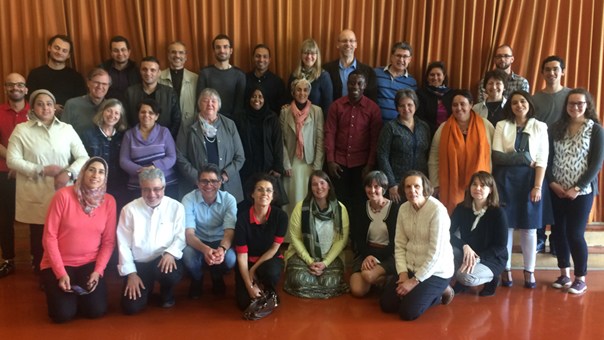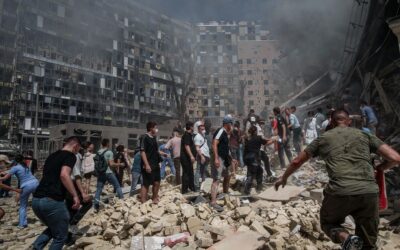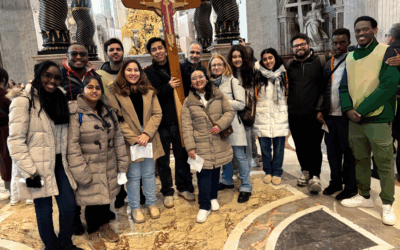 «What lies in our heart? Towards what is it oriented? How can we learn to know it better? Aren’t the paths of the heart like roller coasters?» These are some of the issues which stimulated the dialogue between Christians and Muslims participating in a meeting and were visible signs of the desire of both groups to share. The meeting was held at the Muslim cultural center at the end of April and ended in the evangelic parish. It started with the theological reflections of the evangelical pastor, Martin Hoegger, and the Imam, Djalel Meskaldji. Both considered how the Bible and the Koran amplify the meaning of the word “heart,” not only as the seat of sentiments, but rather as the center of our being, and that space where we find dialogue with our own selves, with the others and with God. «The most common disease is not the flu, but schlerosis, that is, the hardening of the heart», M. Hoegger ironically said. And Djalel Meskaldji added: «According to the Koran, the heart can be even harder than stones. It is covered with rust.» They underlined in fact, that the heart is the most precious thing we have, but experience tells us that often it can harden. This leads to the consideration that the “custody of the heart” is a frequent theme in the Bible and in the Fathers of the Church, theologians of the first centuries. And so, to keep a strong hold on one’s heart is a real “spiritual battle.” This would be, according to Meskaldji, the real meaning of the word “Jihad,” according to Muslim tradition. Pastor Hoegger recalled that the biblical prophets «announced that God will one day chisel his law of love in our hearts and put in us a new heart, a heart of flesh.» Furthermore: «Christians turn to Jesus in whom this promise was fulfilled.» On his part, the Imam stressed that: «the Koran repeatedly affirms that the heart needs to be purified by the limpid water of the word of God. It wakens my heart, nurtures it, breaks its toughness and cleans it of the rust that is mostly the outcome of pride.» From Algiers, in live streaming Sheherazad and Farouk, Muslims, recounted how the discovery of God who is love, through the spirituality of the Focolare Movement, has revolutionised their lives as a couple: «We have learned how to love the other for himself, and let God act in the heart of each one so as to be a living witness of the unity of God. But above all, we experience God’s grace which encloses our heart with his mercy.» Then, Anne Catherine Reymond and Fabien, Christians of the Sant’Egidio Community, shared their pathway, narrating how the presence of God has transformed their hearts through prayer and fraternal life, and also through their contact with the poor. «Faith in God is a compass in the challenges which a couple has to face, especially in the education of their children. They push us to place ourselves on a second plane so as to put God in the first place.» What came to light in the group dialogues was what Christians and Muslims have in common. A Muslim woman from Lyon concluded: «In an era in which many try to divide our communities, it is very important to gather together in an atmosphere of mutual esteem!» In this joyful day the participants unanimously expressed the desire to continue the dialogue, also through new encounters.
«What lies in our heart? Towards what is it oriented? How can we learn to know it better? Aren’t the paths of the heart like roller coasters?» These are some of the issues which stimulated the dialogue between Christians and Muslims participating in a meeting and were visible signs of the desire of both groups to share. The meeting was held at the Muslim cultural center at the end of April and ended in the evangelic parish. It started with the theological reflections of the evangelical pastor, Martin Hoegger, and the Imam, Djalel Meskaldji. Both considered how the Bible and the Koran amplify the meaning of the word “heart,” not only as the seat of sentiments, but rather as the center of our being, and that space where we find dialogue with our own selves, with the others and with God. «The most common disease is not the flu, but schlerosis, that is, the hardening of the heart», M. Hoegger ironically said. And Djalel Meskaldji added: «According to the Koran, the heart can be even harder than stones. It is covered with rust.» They underlined in fact, that the heart is the most precious thing we have, but experience tells us that often it can harden. This leads to the consideration that the “custody of the heart” is a frequent theme in the Bible and in the Fathers of the Church, theologians of the first centuries. And so, to keep a strong hold on one’s heart is a real “spiritual battle.” This would be, according to Meskaldji, the real meaning of the word “Jihad,” according to Muslim tradition. Pastor Hoegger recalled that the biblical prophets «announced that God will one day chisel his law of love in our hearts and put in us a new heart, a heart of flesh.» Furthermore: «Christians turn to Jesus in whom this promise was fulfilled.» On his part, the Imam stressed that: «the Koran repeatedly affirms that the heart needs to be purified by the limpid water of the word of God. It wakens my heart, nurtures it, breaks its toughness and cleans it of the rust that is mostly the outcome of pride.» From Algiers, in live streaming Sheherazad and Farouk, Muslims, recounted how the discovery of God who is love, through the spirituality of the Focolare Movement, has revolutionised their lives as a couple: «We have learned how to love the other for himself, and let God act in the heart of each one so as to be a living witness of the unity of God. But above all, we experience God’s grace which encloses our heart with his mercy.» Then, Anne Catherine Reymond and Fabien, Christians of the Sant’Egidio Community, shared their pathway, narrating how the presence of God has transformed their hearts through prayer and fraternal life, and also through their contact with the poor. «Faith in God is a compass in the challenges which a couple has to face, especially in the education of their children. They push us to place ourselves on a second plane so as to put God in the first place.» What came to light in the group dialogues was what Christians and Muslims have in common. A Muslim woman from Lyon concluded: «In an era in which many try to divide our communities, it is very important to gather together in an atmosphere of mutual esteem!» In this joyful day the participants unanimously expressed the desire to continue the dialogue, also through new encounters.
Allow yourself to be wounded by compassion
Allow yourself to be wounded by compassion




0 Comments